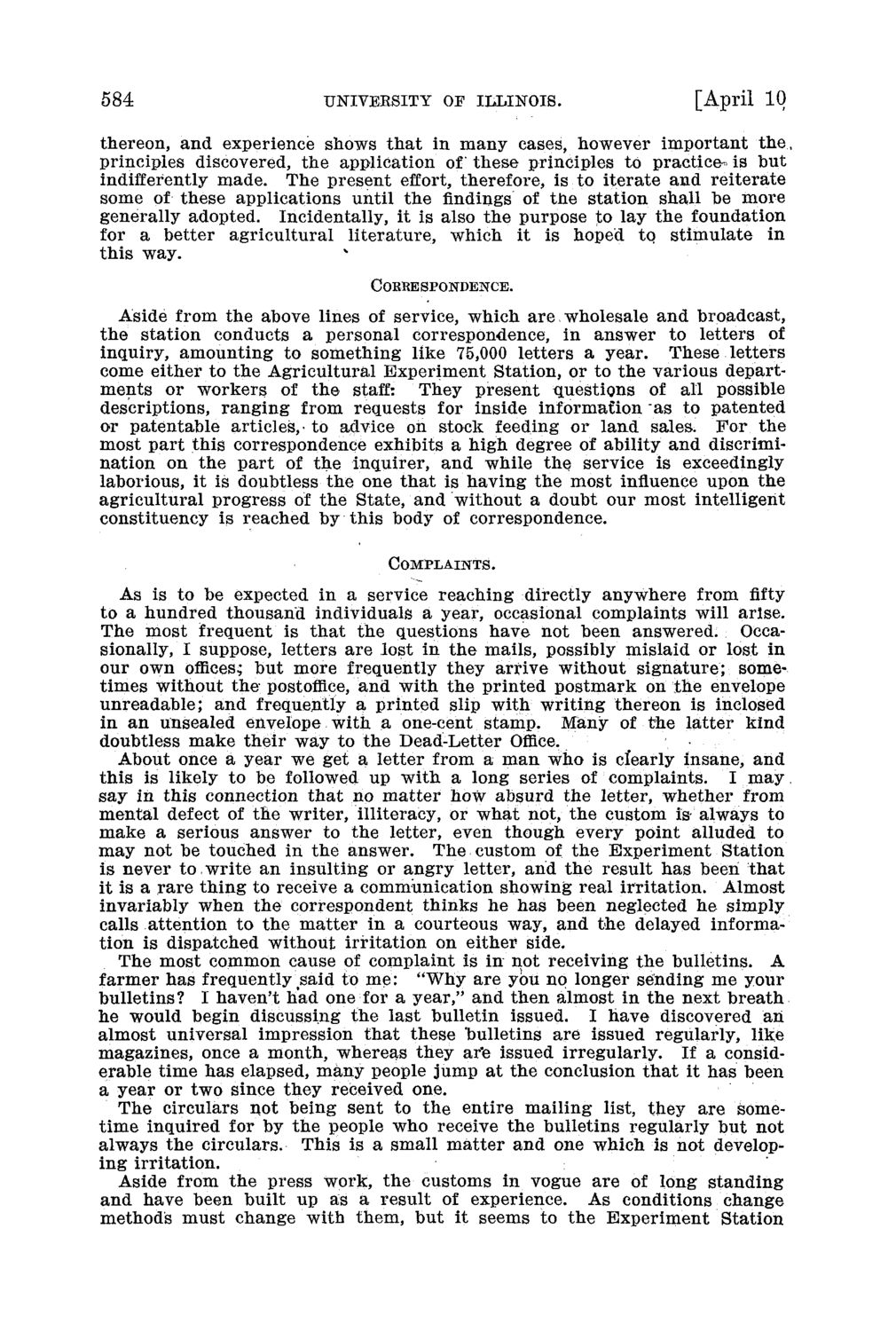| |
| |
Caption: Board of Trustees Minutes - 1912
This is a reduced-resolution page image for fast online browsing.

EXTRACTED TEXT FROM PAGE:
584 UNIVERSITY OF ILLINOIS. [April 10 thereon, and experience shows that in many cases, however important the, principles discovered, the application of these principles to practice- is but indifferently made. The present effort, therefore, is to iterate and reiterate some of these applications until the findings of the station shall be more generally adopted. Incidentally, it is also the purpose to lay the foundation for a better agricultural literature, which it is hoped to stimulate in this way. CORRESPONDENCE. Aside from the above lines of service, which are wholesale and broadcast, the station conducts a personal correspondence, in answer to letters of inquiry, amounting to something like 75,000 letters a year. These letters come either to the Agricultural Experiment Station, or to the various departments or workers of the staff: They present questions of all possible descriptions, ranging from requests for inside information as to patented or patentable articles,- to advice oh stock feeding or land sales. For the most part this correspondence exhibits a high degree of ability and discrimination on the part of the inquirer, and while the service is exceedingly laborious, it is doubtless the one that is having the most influence upon the agricultural progress of the State, and without a doubt our most intelligent constituency is reached by this body of correspondence. COMPLAINTS. As is to be expected in a service reaching directly anywhere from fifty to a hundred thousand individuals a year, occasional complaints will arise. The most frequent is that the questions have not been answered. Occasionally, I suppose, letters are lost in the mails, possibly mislaid or lost in our own offices.; but more frequently they arrive without signature; sometimes Without the postoffice, and with the printed postmark on the envelope unreadable; and frequently a printed slip with writing thereon is inclosed in an unsealed envelope with a one-cent stamp. Many of the latter kind doubtless make their way to the Dead-Letter Office. About once a year we get a letter from a man who is cfearly insane, and this is likely to be followed up with a long series of complaints. I may say in this connection that no matter how absurd the letter, whether from mental defect of the writer, illiteracy, or what not, the custom is always to make a serious answer to the letter, even though every point alluded to may not be touched in the answer. The custom of the Experiment Station is never to,write an insulting or angry letter, and the result has been that it is a rare thing to receive a communication showing real irritation. Almost invariably when the correspondent thinks he has been neglected he simply calls attention to the matter in a courteous way, and the delayed information is dispatched without irritation on either side. The most common cause of complaint is in not receiving the bulletins. A farmer has frequently^said to me: "Why are you no longer sending me your bulletins? I haven't had one for a year," and then almost in the next breath he would begin discussing the last bulletin issued. I have discovered ah almost universal impression that these bulletins are issued regularly, like magazines, once a month, whereas they ar*e issued irregularly. If a considerable time has elapsed, many people jump at the conclusion that it has been a year or two since they received one. The circulars not being sent to the entire mailing list, they are sometime inquired for by the people who receive the bulletins regularly but not always the circulars. This is a small matter and one which is not developing irritation. Aside from the press work, the customs in vogue are of long standing and have been built up as a result of experience. As conditions change methods must change with them, but it seems to the Experiment Station
| |